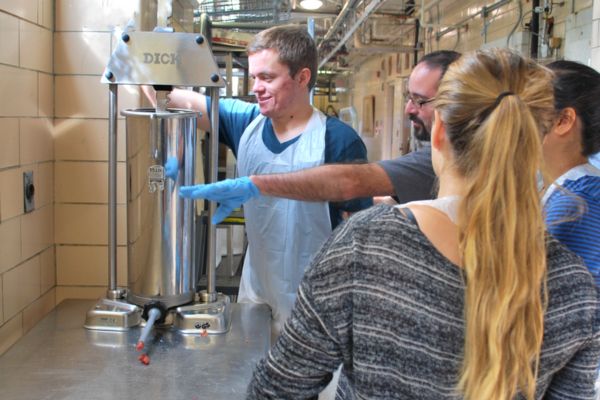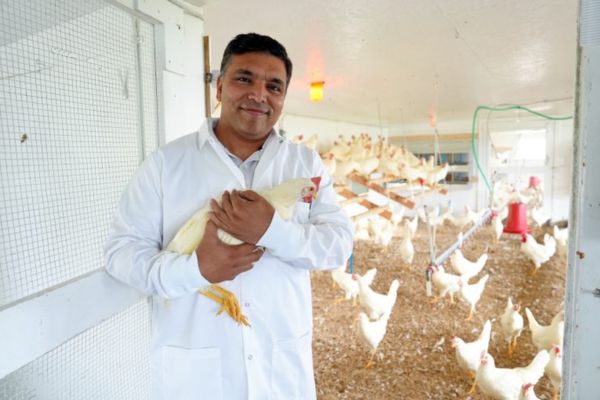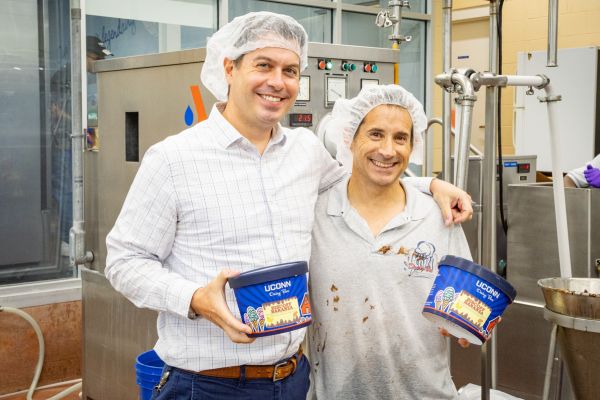Animal Science BS
Food Science
Area of Interest
Overview
The Food Science area of interest is designed to prepare students for a variety of careers in the food industry. The sequence of courses is structured to enable students to develop knowledge and skills in the production and processing of food through biology, chemistry, and food science-related courses.
Requirements
Animal Science majors must pass all courses from Group A, at least one course from Group B, at least one course from Group C, and one additional course from either Group B or C. No single class can satisfy more than one requirement.
Every undergraduate student in a baccalaureate degree program in the University, on all campuses, must complete the Common Curriculum. The Common Curriculum requires students to complete six Topics of Inquiry and three Competencies. All students must complete a minimum of 40 credits of coursework approved for the Common Curriculum.
Students must meet a set of requirements established by the college in addition to the University's Common Curriculum requirements. For more information, see the College of Agriculture, Health and Natural Resources section of the Undergraduate Student Catalog.
Sample Four-Year Plan
This is an example schedule for planning purposes only and is meant to be a guide for students and advisors. 120 credits total needed to complete degree. For official degree information, please contact the Degree Audit section of the Office of the Registrar and speak with your advisor.
- ANSC 1001: Introduction to Animal Science (3 Credits) — The biological, physical, and social factors that influence animal production and utilization.
- BIOL 1107: Principles of Biology I (4 Credits) — Designed to provide a foundation for more advanced courses in Biology and related sciences. Topics covered include molecular and cell biology, animal anatomy and physiology. Lab exercises include dissection of preserved animals. CA 3-LAB.
- Information Literacy (4 Credits): To satisfy the Information Literacy requirement, students must pass at least one of the following: ENGL 1007 (Seminar and Studio Writing and Multimodal Composition), ENGL 1010 (Seminar in Academic Writing), ENGL 1011 (Seminar in Writing through Literature).
- UNIV 1810: Animal Science Learning Community (1 Credit) — A course designed to assist students in adjusting to the University of Connecticut and to improve academic performance. Students will be exposed to UConn resources and facilities, enhance their academic and interpersonal skills, and learn strategies for problem solving and time management.
- Common Curriculum OR MATH OR STAT Course (3 Credits)
- ANSC 1111: Principles of Animal Nutrition and Feeding (3 Credits) — Digestive anatomy of various species and the classes of nutrients including their digestion, metabolism and sources. Nutrient requirements and feeding standards for livestock, companion animals, exotics and aquatics for purposes of reproduction, lactation, growth, work and maintenance. Classes of feedstuffs, their characteristics, proper utilization, formulating rations and nutritional programs for animal enterprise. Taught with SAAS 113.
- BIOL 1108: Principles of Biology II (4 Credits) — Designed to provide a foundation for more advanced courses in biology and related sciences. Topics covered include evolution and population genetics, plant physiology and diversity, animal diversity and behavior, and ecology. CA 3-LAB.
- CHEM 1127Q: General Chemistry I (4 Credits) — Designed to provide a foundation for more advanced courses in chemistry. Atomic theory, laws and theories concerning the physical and chemical behavior of gases, liquids, solids, and solutions. Quantitative measurements illustrating the laws of chemical combination in the laboratory component. CA 3-LAB.
- Common Curriculum OR MATH OR STAT Course (3-4 Credits)
- ANSC 1645: The Science of Food (3 Credits) — (Also offered as NUSC 1645.) An introductory level course for students interested in the application of science to food. Nutritional and functional attributes of various food constituents are discussed. Issues concerning food processing and food safety are covered. CA 3.
- PATH 2100: Anatomy and Physiology of Animals (4 Credits) — A study of the anatomy and physiology of animals with reference to pathological changes of the component parts of the body.
- ANSC 3121: Principles of Animal Genetics (3 Credits) — Principles of Mendelian and molecular genetics. Biosynthesis and function of DNA, RNA, and protein. This course also includes introductions to population and quantitative genetics. Information on molecular methods of genetic analysis and examples of genetics in animals of agricultural significance are also provided.
- CHEM 1128Q: General Chemistry II (4 Credits) — Equilibrium, thermodynamics, nuclear chemistry, and kinetics. Properties of some of the more familiar elements and their compounds. Equilibrium in solutions and reactions of the common cations and anions in the laboratory component. CA 3-LAB.
- Group B ANSC Elective Course (3-4 Credits)
- NUSC 1165: Fundamentals of Nutrition (3 Credits) — An introduction to the principles and concepts of nutrition with emphasis on the nature and function of carbohydrates, fats, proteins, minerals and vitamins, and their application to the human organism. CA 3.
- ANSC 3122: Reproductive Physiology (4 Credits) — A study of the reproductive anatomy and physiology of domestic animals. Laboratory will include macro and micro anatomy, hormone action, and techniques used in reproductive management of domestic animals.
- CHEM 2241: Organic Chemistry (3 Credits) — An abridged course in organic chemistry designed to provide a background for related fields in which a general rather than a detailed knowledge of the compounds of carbon is required.
- Group B ANSC Elective Course (3-4 Credits)
- NUSC 1167: Food, Culture and Society (3 Credits) — Social, cultural, and economic factors affecting food intake and nutritional status. Includes contemporary topics such as world food problems, hunger in the United States, dieting and eating disorders, health foods and vegetarianism. CA 4-INT.
- ANSC 3194: Career Paths in Animal Science (1 Credit) — A discussion of current employment opportunities in animal sciences. In addition, students will prepare resumes and make oral presentations.
- ANSC 3343/ANSC 3344W*: Animal Food Products (4 Credits) — ANSC 3343: A study of the food products derived from animal agriculture, including dairy, meat, poultry and fish. Emphasis will be placed on inspection, grading, processing, biochemistry, nutritive value and food safety concerns of these products. Taught with SAAS 243. ANSC 3344W: A writing-intensive class integrated with course content in ANSC 3343.
- 2000-Level Related OR Elective Course (3 Credits)
- NUSC 3233/NUSC 3234: Food Composition and Preparation (4 Credits) — NUSC 3233: Study of the composition of food and the physical and chemical changes that occur during preparation and/or processing that affect taste, palatability, shelf-life, and nutrient content. NUSC 3244: Laboratory techniques related to composition of foods, and the physical and chemical changes that occur during preparation.
- Common Curriculum Course (3 Credits)
- Common Curriculum Course (3 Credits)
*W course must be taken with the corresponding C course.
- ANSC 3641: Animal Food Products: Dairy Technology (3 Credits) — Production and processing of milk and milk-products from a food science perspective including chemical, physical and microbiological components. Technological aspects of the transformation of milk into various food products. Public health regulations, good manufacturing practices, cleaning and sanitizing procedures. Unit operations in dairy food manufacturing, packaging, labeling and quality control procedures.
- ANSC 4341: Food Microbiology and Safety (3 Credits) — Current topics in food safety will be discussed, with special emphasis on microbial and chemical contamination of food. Specific topics including the safety of natural versus synthetic chemicals, food additives, irradiation and other practices, basic microbiology and toxicology, current regulatory practices and risk assessment will also be included. The Hazard Analysis Critical Control Points (HACCP) approach to food safety will be discussed.
- ANSC 3642W* OR ANSC 4342W* (1 Credit)
- Common Curriculum Course (3 Credits)
- Common Curriculum Course (3 Credits)
*W course must be taken with the corresponding C course.
- ANSC 3318: Probiotics and Prebiotics (3 Credits) — Biology, uses, effectiveness and safety of probiotics and prebiotics. Molecular mechanisms underlying the health benefits attributed to the consumption of pre and probiotics. Application of pre- and probiotics to promote human and animal health, including safety and regulation.
- ANSC 4343: Muscle Biology and Muscle Food Chemistry (3 Credits) — Molecular and cellular basis of muscle food physical features and its related muscle biological events.
- 2000-Level Related OR Elective (3 Credits)
- MCB 2000: Intro to Biochemistry (4 Credits) — The structure, chemistry, and metabolism of carbohydrates, lipids and proteins. Enzyme function and kinetics, energy metabolism, and structure and function of nucleic acids. A survey course for students of agriculture, general biology, medical technology, nursing, and pharmacy. Molecular and Cell Biology majors, biophysics majors, and other students desiring a more intensive introduction or considering advanced course work in biochemistry or molecular biology should take MCB 3010.
- Common Curriculum Course (3 Credits)
- ANSC 5641: Food Chemistry (3 Credits) — Chemical, physical and biological changes in foods and food macromolecules that occur during processing and storage that affect texture, color, flavor, stability and nutritive qualities. Field trips may be required.
- Group B/C ANSC Elective (3-4 Credits)
- NUSC 3350: Nutrient and Food Analysis (3 Credits) — An overview of analytical techniques and instrumentations commonly used in the food industry to determine food quality. Laboratories involve hands-on trainings on analytical equipment to collect and analyze experimental data on various food samples.
- 2000-Level Related OR Elective (3 Credits)
- 2000-Level Related OR Elective (3 Credits)
- ANSC 1645: The Science of Food
- Credits: 3
- Offered: Spring
- ANSC 3318: Probiotics and Prebiotics
- Credits: 3
- Group: B
- Offered: Spring
- Prerequisites: MCB 2610 or Eq.
- ANSC 3343: Animal Food Products
- Credits: 3
- Group: C
- Offered: Fall
- ANSC 3641: Animal Food Products: Dairy Technology
- Credits: 3
- Group: C
- Offered: Spring
- ANSC 4341: Food Microbiology and Safety
- Credits: 3
- Offered: Spring
- Prerequisites: BIOL 1107
- ANSC 4343: Muscle Biology and Muscle Food Chemistry
- Credits: 3
- Offered: Fall
- Prerequisites: ANSC 3343 or CHEM 2241 or CHEM 2443
- ANSC 5641: Food Chemistry
- Credits: 3
- Offered: Spring
- ARE 2260: Food Policy
- Credits: 3
- Offered: Fall, Spring
- Prerequisites: ARE 1150 or ECON 1200 or 1201
- MCB 2000: Introduction to Biochemistry
- Credits: 4
- Group: A-3
- Offered: Fall, Spring
- Prerequisites: CHEM 2241 or 2444
- NUSC 1165: Fundamentals of Nutrition
- Credits: 3
- Offered: Fall, Spring
- NUSC 1167: Food, Culture and Society
- Credits: 3
- Offered: Fall, Spring
- NUSC 3233: Food Composition and Preparation
- Credits: 3
- Offered: Fall
- Prerequisites: NUSC 1165
- NUSC 3234: Food Composition and Preparation Lab
- Credits: 1
- Offered: Fall
- Prerequisites: NUSC 1165
- NUSC 3350: Nutrient and Food Analysis
- Credits: 3
- Offered: Spring
- Prerequisites: CHEM 2241 and NUSC 1165
- SPSS 2100E: Environmental Sustainability of Food Production in Developed Countries
- Credits: 3
- Offered: Fall
- STAT 1100Q: Elementary Concepts of Statistics
- Credits: 4
- Offered: Fall, Spring


